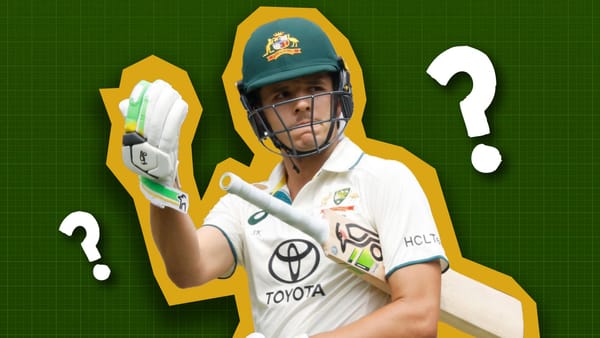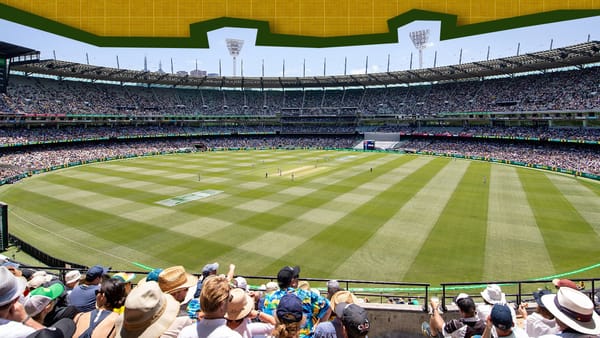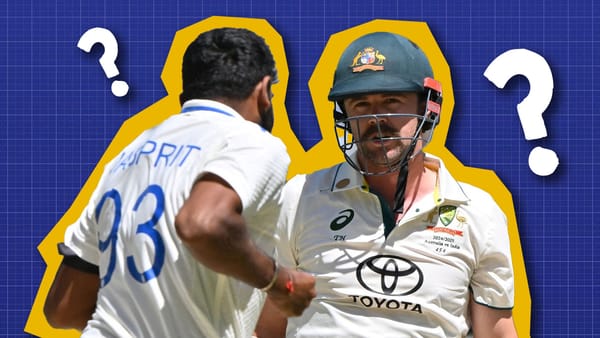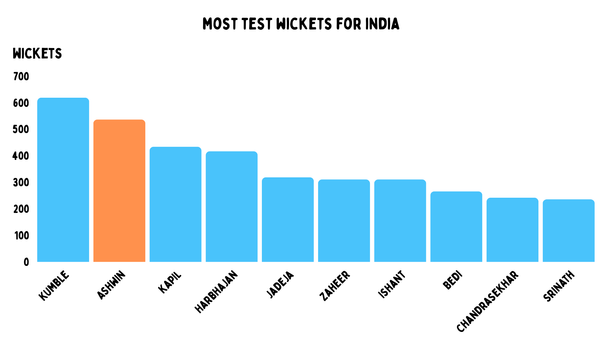#YpuGate: Cricket and the media
A look at cricket and the media, with a quick trip to Woj Bomb's
If you are on social media, chances are by now you will know about Wriddhiman Saha's tweets about how a "respected" Indian journalist tried to bully him into being interviewed.
After all of my contributions to Indian cricket..this is what I face from a so called “Respected” journalist! This is where the journalism has gone.
— Wriddhiman Saha (@Wriddhipops) 4:42 PM ∙ Feb 19, 2022
Saha has decided not to name the journalist, which is ofcourrse getting funnier and funnier, as pretty much everyone seems to be guessing who it is. With some fans going as far as matching up previous typos to out him.
Everywhere I see "ypu" on twitter :)
— Bharath Ramaraj (@Fancricket12) 7:32 AM ∙ Feb 23, 2022
I don't have any information on whether it is that journalist, but would add that just reading the messages I assumed who it was. Because there really aren't that many journalists big enough to try to do that, and most just wouldn't anyway.
But it is also interesting for a few other reasons. This message is very similar to what happened to ESPN's major basketball writer who had a prospectus leaked where he basically sold himself as someone who you could leak stories too.
From Ethan Strauss’ piece "These packets have been sent out to potential sources, presumably to argue why one should leak news to Wojnarowski versus sending news to his rivals. Though the packets feature the ESPN logo on each slide, suggesting ESPN documents, my sources tell me that ESPN did not create Wojnarowski's self-aggrandising dossier."
The idea is that Woj (as he is known) can leak your story to a wider audience than anyone else. And also, if you want, tag you in it when you publicly confirm it. Meaning that not only will your story get more air, but you will also improve your fame through it.
After all of my contributions to Indian cricket..this is what I face from a so called “Respected” journalist! This is where the journalism has gone.
— Wriddhiman Saha (@Wriddhipops) 4:42 PM ∙ Feb 19, 2022
When you look at the Saha tweet, there is a really interesting message here. "You try to choose 11 journalists which is not the best according to me. Choose whoever can help the most. "
That is essentially the same thing as what Woj is trying to say. That by leaking to this one journalist he can help improve things for the player. Over saying the same thing to a host of cricket and news publications.
The difference here is the threats at the end. And probably the lack of a real relationship at the start.
But we've never had anything like this in cricket before because we've never really had cricket news breakers before. Cricket writers have been either literary colour, earnest match reporters, or a combination of both. Actual news-breaking by cricket writers is not that common. It's become more so over the last few years, but even then, we don't have any celebrity news breakers in cricket like other sports have.
The 76ers have been in the market for a backup center and will be aggressive in pursuit of DeAndre Jordan — either placing a waiver claim or working to sign him as a free agent should he clear waivers, sources tell ESPN.
— Adrian Wojnarowski (@wojespn) 12:47 AM ∙ Mar 1, 2022
Woj has over five million followers, and many of them follow him like he's a team. Proudly calling each new item about how a player has been swapped for a second-round draft pick with a # WojBomb reference.

We don't have that culture in cricket, partly because cricket is not a league unlike the US sports. As far as I'm aware, I was the first global cricket writer. It wasn't a beat that people covered before. When I started nearly everyone in cricket reported just on their home nation. Outside of a few Cricinfo staff at World Cups.
In the past, players and writers had very close relationships. They often stayed in the same hotels and travelled on planes together. When my career started, cricket writers were complaining about not getting business class or staying in five-star hotels.
But while a lot of that was preferring to have legroom and a pillow selection, it was also crucial that you could form bonds with players. Cricketers and the press have never been further apart.
And one reason is since the separation of the press and the players, there has been no move to really fix that.
Take US sports as an example; there has been even more of a split there between those two camps because money has been there longer. But they kept a connection through the change room. Literally at the end of games the press and players get together in the US to chat.
They have a proper relationship there. It's public, open, and works far more than any relationship involving a press conference. Players in this situation have the ability to talk to writers about their pieces, and the press have the ability in an hour to clear up an entire story that would take months otherwise.
It's not perfect. And the NBA have already talked about scrapping it as Covid becomes more manageable. That would be a mistake, even if I understand that the players have reservations about it.
But cricket has not got a good enough connection between players and the press. And while I appreciate that in the modern world players can - and should - tell their own stories. There is always going to be media, and they play a role in professional sports, from the broadcasters down to the humble beat writers and social media consultants. From telling the truth to power, and uncovering secrets that players and boards don't want out there.
However, as someone who has also had an obvious story about me almost published by a cricket writer, I know this isn't always a rosy profession.
And writing about athletes is tough, as political journalists often find, the people you file on go from a source to a story very quickly. And there is an element of access needed for the job; you need to be in the ground, allowed at press conferences. And as someone who has lost that right by covering stories, it can affect how you pay the bills.
But that isn't the only kind of journalist in cricket. There are two newer ones, the news specialists and the content aggregators.
The content aggregators usually take three tweets and turn it into "Netizens call Rohit Sharma dumber than dogshit". I don't think many people take these articles that seriously.
But the hard news part of it is more interesting. Because that can be a big deal. When my career started sports journalists were kind of uninspired, and happy to worry about prose, their contacts, with the occasional headline. It's not like that now; it's much more dynamic and opportunistic. And as cricket becomes more professional and a major part of the 24-hour news cycle, there is more work for this kind of reporter.
But how do you become one of them? Because getting good relationships with cricketers is tough because of that lack of an ability to really bond with them normally. So either a friendship strikes up normally, or it's slightly forced, but both sides understand the relationship.
They are two things that people outside the sporting system do not understand about 'Ypugate.' One is that how do journalists get to be so powerful so as to be able to threaten a test player.
— Joy Bhattacharjya (@joybhattacharj) 6:39 AM ∙ Feb 22, 2022
Or there is a third kind which Joy Bhattacharjya illustrated on twitter the other day. There is plenty of interesting stuff in what he referred to as YpuGate.
This is one of his tweets.
The other was when a fair number of journalists figured that the best way to get access was to become more than journalists. Pick up a cricketer's wife and take them shopping, get hold of concert tickets to a show in London....
— Joy Bhattacharjya (@joybhattacharj) 6:39 AM ∙ Feb 22, 2022
This is the fixer journalist - not match-fixing obviously, And there is two different ways this can work. Sometimes a player will contact me in a city they think I know well to ask something. That is fairly normal, but there are others who become players fixers. Not in the match fix sense, but almost like a backup agent. Making the players life easier. Making themselves an integral part of that player's life.
And it would be a lie to say the players don't use these journalists as well. Players might get preyed upon early, but they also realise they can spin things publicly through their "friend".
But the entire relationship is compromised, and often just icky.
And boards don't help with all this either. Keeping the distance and often enforcing it means that nothing is more important than gaining access. And the kinds of people who do will make entire careers off it. So it's big business at this point. But do you really want to make access to your players a business on its own?
If cricket boards found ways to make their players more accessible, these relationships would be rarer. Weirdly cricket boards often they think are protecting their players by creating so much space, but the truth is often the opposite. Leaving it unregulated can't ever be a good idea.
But as Woj's document makes clear, even in the NBA, when access is money, people will do whatever they can to profit from that. And Woj is incredibly powerful, because he has worked with so many important people along the way, and now also built this incredible brand.
1/3- I was hurt and offended. I thought not to tolerate such kind of behaviour and didn’t want anyone to go through these kind of bullying. I decided I will go out and expose the chat in public eye, but not his/her name
— Wriddhiman Saha (@Wriddhipops) 12:36 PM ∙ Feb 22, 2022
And what is weird is that Wriddhiman Saha, who asked for none of this, went from hero to villain in the story by not outing that journalist in some eyes. Saha was dropped, then had a respected journalist try and force him into an interview, with vague threats as well. I can see why people would want him to name the person, but I can also understand with the politics involved that it wasn't going to happen once he didn't. I don't think it's really about that one journalist, even though I'd support Saha if he outed him. I think the system needs work.
But to that journalist, whoever you are, ypu should know better.
🎙 Latest Red Inker
— Jarrod Kimber (@ajarrodkimber) 11:35 PM ∙ Feb 25, 2022
My first time on a team bench as a writer
open.spotify.com/episode/0PsbTj…
I made a sports writing course that was cheaper than most, and hopefully far easier to use
— Jarrod Kimber (@ajarrodkimber) 11:15 PM ∙ Feb 28, 2022




